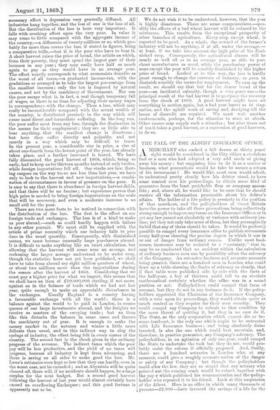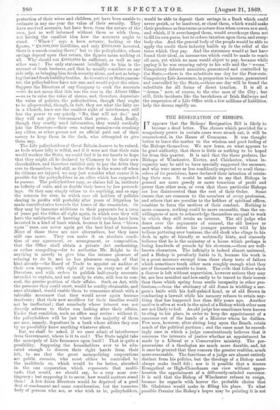THE FALL OF THE ALBERT INSURANCE OFFICE.
AMERCHANT who cashed a bill drawn at thirty years' sight would be considered in the City either a credulous fool or a man who had adopted a • very odd mode of giving away his money ; but supposing him to do it as a matter of business, what precautions would he take to secure a return of his investment He would like, most men would admit, to understand pretty clearly how his debtor stood, to have some control over his proceedings, to obtain some kind of guarantee from the least perishable firm or company access- ible ; and, above all, he would like to be sure that he should receive all the information procurable about his debtor's affairs. The holder of a life policy is precisely in the position of that merchant, and the policyholders of Great Britain have the power to take all those precautions, being collectively strong enough to impose any terms on the Insurance Offices, or to get any law passed not absolutely at variance with ordinary jus- tice; yet they not only take none of them, but they peremptorily forbid that any of them should be taken. It would be perfectly possible to compel every insurance office to publish statements every half-year showing the precise degree in which it was in or out of danger from ordinary causes. Unlike most busi- nesses, insurance may be reduced to a " certainty," that is, may be so conducted that no accident within the calculation of ordinary business men can by possibility affect the solvency of the Company. An extensive business and accurate accounts being granted, there are a hundred men in London who could draw up a table showing the limits of solvency so clearly, that if that table were published side by side with the facts of the half-year, a boy of thirteen could tell to an absolute mathematical certainty whether the office was in a sound position or not. Policyholders could compel that form of account., but they do not in any instance do it. If the policy- holders appointed the Chairman of the Insurance Company, with a veto upon its proceedings, they would obtain quite as much control as they require for their own security. They could compel any Company to submit to that condition by the mere threat of quitting it, but they in no case do it. The State, as the only corporation which cannot die or be- come insolvent, is the only one which ought to be entrusted with Life Insurance business ; and being absolutely disin- terested, is also the one which could best ascertain, and, therefore, in practice guarantee, any Company's solvency. The policyholders, in an agitation of only one year, could compel the State to undertake the task but they do not, would pro- bably resist the reform if officially proposed. And, finally, there are a hundred actuaries in London who, at any moment, could give a roughly accurate notion of the danger or safety of any Company ; but though the policyholders could alter the law, they are so stupid that any actuary who pointed out the coming crash would be ruined, together with the pap, r which published his communication and the policy- holder who repeated it to his friend. Look at this suspension of the Albert. Here is an office in which many thousands of persons-22,800—have invested the savings of a life for the
protection of their wives and children, yet have been unable to estimate in any one year the value of their security. They have received accounts, but have been, from the nature of the case, just as well informed without them as with them, not having the smallest idea how the accounts ought to stand. " Whew ?" says a keen actuary, looking at the figures, " £8,000,000 liabilities, and only £600,000 invested, there is a smash coming there ;" but to the policyholder, whose savings depend upon that return, the figures mean nothing at all. Why should not £600,000 be sufficient, as well as any other sum ? The only statement intelligible to him is the account of fresh business, and that he usually considers on one side only, as bringing him fresh security alone, and not as bring- ing that and fresh liability besides. As to control or State guaran- tee, the policyholders have not one, and would reject the other. Suppose the Directors of any Company to cook the accounts —we do not mean that this was the case in the Albert Office —so as to raise the value of shares, and, therefore, depreciate the value of policies, the policyholders, though they ought to be all-powerful, though, in fact, they are what the laity are in a Church, have not the smallest right of interference, still less the power to say quietly, " No, that will not do ;" and they will not give Government that power. And, finally, though they cruelly need information, they would cordially join the Directors—their own natural enemies—in crushing any editor, or other person not an official paid out of their money to keep them in the dark, who attempted to give them any.
The Life policyholders of Great Britain deserve to be ruined, as fools whose folly is wilful, and if it were not that their ruin would weaken the State, we could find it in our hearts to hope that they might all be declared by Chancery to be their own shareholders, and therefore entitled only to pay the debts they owe to themselves; but still, as the State is the worse off when its citizens are injured, we may just consider what course it is possible for the policyholders in an office which has suspended to pursue. The policyholders may, as claims fall in, institute an infinity of suits, and so double their losses by law proceed- ings. Or they may simply refuse to do anything, and so stop the concern for ever, in which case all holders of policies sharing in profits will probably after years of litigation be made contributories towards the losses of the remainder. Or they may by immense additions to their payments for a term of years put the Office all right again, in which case they will have the satisfaction of knowing that their savings have been invested in a kind of bank which, because it has been " blown upon " once, can never again get the best kind of business. None of those three are nice alternatives, but they have still one more. They can make it an absolute condi- tion of any agreement, or arrangement, or composition, that the Office shall obtain a private Act authorizing, or rather compelling—for to authorize Mr. Bright to do anything is merely to give him the intense pleasure of refusing to do it, and he has pleasures enough of that kind already—the Board of Trade to appoint an auditor at their own expense, with right of veto on every act of the Directors, and with orders to publish half-yearly accounts intended to explain, and not merely to state, still less to con- ceal, the precise position of their affairs. Such an Act, with the pressure they could exert, would be readily obtainable, and once obtained, would enable them to commence afresh with a tolerable assurance that they would never again become insolvent ; that their new sacrifices for their families would not be ineffectual ; that somebody whose interest was not directly adverse to theirs was looking after their affairs. Under that condition, such an office may revive : without it, the policyholders will be just where the majority of them are now, namely, depositors in a bank whose affairs they can by no possibility know anything whatever about.
But, we shall be asked, if we once admit of interference from Government, where is it to end ? The State might take the monopoly of Life Insurance upon itself ! That is quite a possibility. Supposing the householders ever to be edu- cated enough to discern their right hands from their left, to see that the great monopolizing corporations are public enemies, who must either be controlled by the multitude or, which would be far better, absorbed in the one corporation which represents that multi- tude, that would, we should say, be a very near con- tingency ; but supposing it to occur, how would matters stand then ? A few dozen Directors would be deprived of a good deal of emolument and some consideration, but the immense body of persons who are, or who wish to be, policyholders, would be able to deposit their savings in a Bank which could never perish, or be insolvent, or cheat them, which would make their prudence as fructuous as nature does when sowers sow seed, and which, if it overcharged them, would overcharge them not to fill its own purse, but to reduce taxation upon them and every- body else. And the general body of the people would be able to apply the credit their industry builds up to the relief of the taxes which they pay. And the statesmen would at last have found their ideal, an income-tax which could be made to reach all men, yet which no man would object to pay, because while paying it he was ensuring safety to his wife and the "weans." Compulsory deferred annuities, guaranteed and controlled by the State,—there is the substitute one day for the Poor-rate. Compulsory Life Assurance, in proportion to income, guaranteed and controlled by the State,—there one day will be found the substitute for all forms of direct taxation. It is all a " dream " now, of course, to the wise men of the City ; but still, little incidents like the breakdown of Irish Railways and the suspension of a Life Office with a few millions of liabilities, help the dream rapidly on.































 Previous page
Previous page